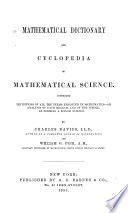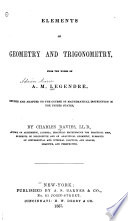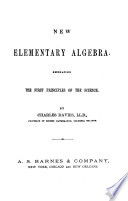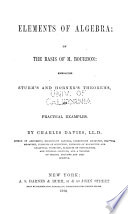 | Charles Davies, William Guy Peck - Mathematics - 1855 - 628 pages
...recorded in a book, called the log-book. LOG'A-RITHM [Gr. Aoyor, ratio, and арЛцос. number]. The logarithm of a number is the exponent of the power to which it is necessary to raise a nxcd number, called the base, to produce the given number. If we suppose и to preserve a constant... | |
 | William Smyth - Algebra - 1855 - 370 pages
...produce these numbers; this would be a table of logarithms. The logarithm of a number, is, therefore, the exponent of the power, to which it is necessary to raise a given or invariable number, in order to produce the proposed number. Thus in the equation a* = y,... | |
 | Adrien Marie Legendre, Charles Davies - Geometry - 1857 - 442 pages
...and the diam eter of the circumscribing circle. PLANE TKIGONOMETEY. INTRODUCTION. OF LOGARITHMS. 1. The logarithm of a number is the exponent of the power to which it is necessary to raise a fixed number, in order to produce the first number. This fixed number is called the base of the system,... | |
 | Charles Davies, William Guy Peck - Mathematics - 1857 - 608 pages
...called the log-book. LOG'A-RITHM [Gi. Aoyoc, ratio, and apifffiof, number]. The logarithm of a number ia the exponent of the power to which it is necessary to raise a fixed number, called the base, to produce the given number. If we suppose a to preserve a constant... | |
 | William Smyth - Algebra - 1858 - 344 pages
...produce these numbers; this would be a table of logarithms. The logarithm of a number, is, therefore, the exponent of the power, to which it is necessary to raise a given or invariable number, in order to produce the proposed number. Thus in the equation a* = y,... | |
 | Charles Davies - Algebra - 1859 - 324 pages
...3/, 10m = M. Unis, if we make т = 0, Ж will be equal to 1 ; if m — 1, M will be equal to 10, &c. Hence, The logarithm of a number is the exponent of...the power to which it is necessary to raise the base of the system in order to produce the number. 217. If, as before, 10 denotes the base of the system... | |
 | Charles Davies - Algebra - 1860 - 412 pages
...value of the number 2f, is called the logarithm of that number ; and a is called the base of Ike syftem in which the logarithm is taken. Hence, The logarithm...logarithms of all numbers corresponding to a given base constitutt a system of logarithms. Any positive number except 1 may be taken as the base of a system... | |
 | Charles Davies - Algebra - 1860 - 328 pages
...if we make m = 0, M will be equal to 1 ; if m = J, M will be equal to 10, &c. Hence, The logarilhm of a number is the exponent of the power to which it is necessary to raise the base of the system in orríer to produce the number. 176. Letting, as before, 10 denote the base of the... | |
 | Charles Davies - Algebra - 1860 - 412 pages
...form, a* = 6, « -s called an exponential equation. The object in solving this equation is, to find the exponent of the power to which it is necessary to raise a given number a, in order to produce another given number b. 225. Suppose it were required to solve... | |
 | Henry Lee Scott - History - 1861 - 674 pages
...effected a lodgement, or the besieged destroyed the lodgements of the enemy. (See SIEGE.) LOGARITHM. The logarithm of a number is the exponent of the power to which another given invariable number must be raised in order to produce the first number. Thus in the common... | |
| |